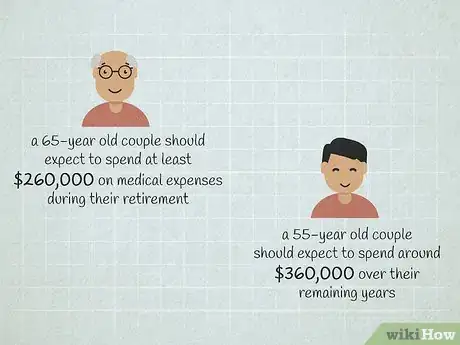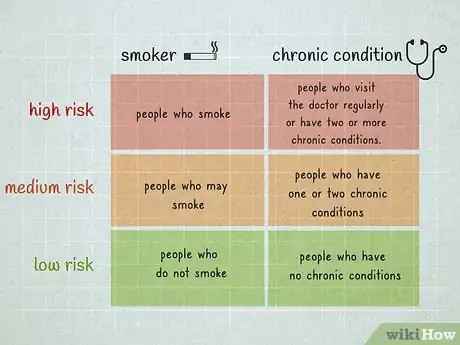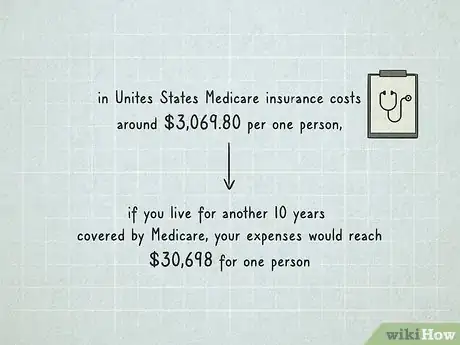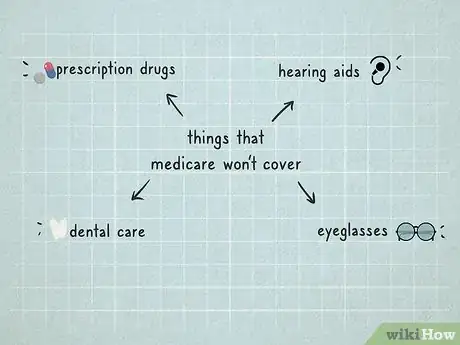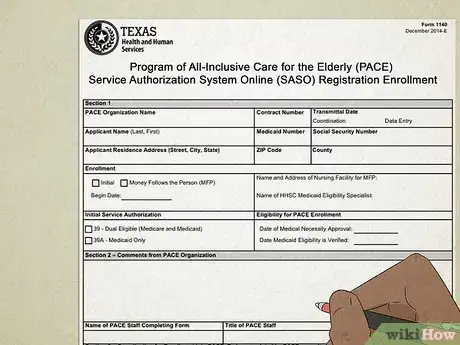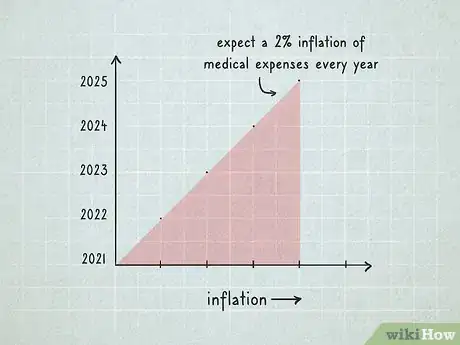This article was co-authored by Dmitriy Fomichenko and by wikiHow staff writer, Hannah Madden. Dmitriy Fomichenko is the president of Sense Financial Services LLC, a boutique financial firm specializing in self-directed retirement accounts with checkbook control based in Orange County, California. With over 19 years of financial planning and advising experience, Dmitry assists and educates thousands of individuals on how to use self-directed IRA and Solo 401k to invest in alternative assets. He is the author of the book "IRA Makeover" and is a licensed California real estate broker.
There are 8 references cited in this article, which can be found at the bottom of the page.
This article has been viewed 9,920 times.
Planning for retirement is never easy, especially when you aren’t sure how much money your medical expenses may be. Medicare expenses and supplemental out of pocket costs can vary, but there are ways to get an estimate for your retirement plan. In this article, we’ve detailed how you can create a budget for your future medical expenses and a few ways to cover those expenses when the time comes.
Steps
Estimating Expenses
-
1Take your age into account. Recent reports show that a 65-year old couple should expect to spend at least $260,000 on medical expenses during their retirement. A 55-year old couple should expect to spend around $360,000 over their remaining years. The younger you plan to retire, the more expenses you will eventually accrue, even if you’re in relatively good health.[1]
- The average life expectancy for a man is 76 years, while the average for a woman is 81 years. The amount of money you’ll need is based on the average life expectancy, so if you live to be older, you’ll probably need a bit more money.
- The older you retire, the less money you’ll have to set aside, simply because you won’t be living as many years in retirement.
-
2Consider your current health. Health risks are divided into 3 categories: low risk, medium risk, and high risk. Experts note that people with high health risks will probably pay 50% to 150% more for medical expenses than people who have low health risks. The categories are defined as:[2]
- Low risk: people who do not smoke and have no chronic conditions.
- Medium risk: people who may smoke or have one or two chronic conditions.
- High risk: people who smoke, visit the doctor regularly, or have 2 or more chronic conditions.
Advertisement -
3Subtract costs covered by Medicare. If you are 65 or older and live in the United States, your health insurance will be covered by Medicare.[3] Most Medicare plans cover most medical expenses, but they also come with yearly deductibles. While you won’t have to pay out of pocket for the bulk of your medical expenses, you may have to pay up to a $3,069.80 deductible per year for basic Medicare, especially if you have to stay in the hospital.[4]
- Therefore, if you live for another 10 years covered by Medicare, your expenses would reach $30,698 for one person.
- There are 4 parts to Medicare: Part A covers your inpatient/hospital stays, part B covers your outpatient/medical coverage, part C is an alternate plan for qualified individuals (also called Medicare private health plan), and part D covers your prescription drugs.[5]
-
4Account for things that Medicare might not cover. If you have Medicare, it won’t cover some prescription drugs, hearing aids, dental care, or eyeglasses. These out of pocket expenses can really add up, especially if you have any pre-existing conditions. Totals for these expenses vary greatly depending on your age and your health.[6]
- The American Dental Association reports that 2 yearly cleanings and x-rays normally cost around $288 annually.
-
5Plan for any long-term care you might need. Unfortunately, Medicare doesn’t cover long-term care, like home nurses or nursing home expenses. If you run into these expenses, you can apply for PACE (Program of All-Inclusive Care for the Elderly) or SHIP (State Health Insurance Assistance Program). These federal and state-run programs will help pay for any long-term care you or your spouse might need.[7]
- These services also cover care costs of cognitive impairment, like Alzheimer’s.
-
6Expect a 2% inflation every year. Unfortunately, medical expenses aren’t exempt to inflation. Just like other prices will rise, so too will your doctor’s appointments, dental visits, and prescriptions. What you pay yearly now might not reflect what you pay in 10 years, so it’s always good to have a little wiggle room.[8]
-
7Aim for an out of pocket budget of $4,500 per year. This is what most experts recommend for someone of retirement age. It will help cover any deductibles you end up paying, as well as unexpected costs, like dental visits, eye glasses, and prescriptions that aren’t covered by your insurance. If you can set aside this much for every year you expect to be in retirement, you will probably be set.[9]
- Experts also recommend revisiting your retirement plan every 5 years, just to make sure it’s keeping up with inflation.
Preparing before Retirement
-
1Create an HSA before you retire. An HSA, or a health savings account, can help you cover some of your medical expenses after you retire. If you want to create an HSA, you can either ask your employer or create one through your bank. Then, you decide how much money you want to add each year (up to $3,600 for individuals and $7,200 for families). When you need to use the money, you won’t be taxed, as long as it’s used for medical or healthcare expenses.[10]
- Once you enroll in Medicare, you won’t be able to make deposits into your HSA anymore.
- Ideally, you would start an HSA now and then keep the money in the account until you retire. However, if you need the money before then, you can take some out to use for medical expenses without getting taxed.
-
2Consider using a high deductible health plan. High deductible plans don't start paying until after you've spent at least $1,400 (for an individual) or $2,800 (for a family) out of pocket for medical expenses. The benefit to these plans is that the premium, or the amount you pay per month for them, is much lower than typical health coverage plans. Usually, you would have a high deductible plan in conjunction with an HSA to pay your out of pocket expenses until the health plan kicks in.[11]
- If you want to look into a high deductible health plan, talk to your employer or shop for one online.
-
3Ask your employer about retirement health coverage. Although it’s less common now, some businesses will keep providing health coverage even after you retire. If you like your health plan now and you want to stick with it, consider talking to your employer to see if that’s an option. If it is, you may be able to keep your healthcare coverage even though you’re no longer working.[12]
- If your employer doesn’t offer it, check with your spouse’s employer, too.
-
4Try a Roth IRA for fewer taxes. Since you might have to pull money out of your retirement for medical expenses, it’s worth looking into a Roth IRA rather than a traditional IRA or a 401(k). In a Roth IRA or a Roth 401(k), retirement withdrawals are free, which can really save you money if you have to pay any out of pocket expenses.[13]
- Many businesses offer both traditional IRAs and Roth IRAs. If you’d like to switch, talk to your employer.
- If your employer doesn’t offer it and you make less than $117,000 per year, you can contribute up to $5,500 to a Roth IRA annually. If you’re over 50, you can contribute up to $6,500.
Expert Q&A
-
QuestionHow do I protect my money from a nursing home?
 Jonathan DeYoe, CPWA®, AIF®Jonathan DeYoe is a Financial Advisor and the CEO of Mindful Money, a comprehensive financial planning and retirement income planning service based in Berkeley, California. With over 25 years of financial advising experience, Jonathan is a speaker and the best-selling author of "Mindful Money: Simple Practices for Reaching Your Financial Goals and Increasing Your Happiness Dividend." Jonathan holds a BA in Philosophy and Religious Studies from Montana State University-Bozeman. He studied Financial Analysis at the CFA Institute and earned his Certified Private Wealth Advisor (CPWA®) designation from The Investments & Wealth Institute. He also earned his Accredited Investment Fiduciary (AIF®) credential from Fi360. Jonathan has been featured in the New York Times, the Wall Street Journal, Money Tips, Mindful Magazine, and Business Insider among others.
Jonathan DeYoe, CPWA®, AIF®Jonathan DeYoe is a Financial Advisor and the CEO of Mindful Money, a comprehensive financial planning and retirement income planning service based in Berkeley, California. With over 25 years of financial advising experience, Jonathan is a speaker and the best-selling author of "Mindful Money: Simple Practices for Reaching Your Financial Goals and Increasing Your Happiness Dividend." Jonathan holds a BA in Philosophy and Religious Studies from Montana State University-Bozeman. He studied Financial Analysis at the CFA Institute and earned his Certified Private Wealth Advisor (CPWA®) designation from The Investments & Wealth Institute. He also earned his Accredited Investment Fiduciary (AIF®) credential from Fi360. Jonathan has been featured in the New York Times, the Wall Street Journal, Money Tips, Mindful Magazine, and Business Insider among others.
Author, Speaker, & CEO of Mindful Money Buy long-term care insurance! Once you pay for the insurance, your plan can cover the costs of a nursing home or in-home care for several years.
Buy long-term care insurance! Once you pay for the insurance, your plan can cover the costs of a nursing home or in-home care for several years.
References
- ↑ https://www.consumerreports.org/retirement-planning/plan-now-manage-medical-expenses-when-you-retire/
- ↑ https://www.nerdwallet.com/article/insurance/medicare/what-will-you-spend-on-health-care-costs-in-retirement
- ↑ https://www.medicare.gov/what-medicare-covers/your-medicare-coverage-choices/whats-medicare
- ↑ https://www.aarp.org/health/medicare-insurance/info-12-2012/health-care-costs.html
- ↑ https://www.medicareinteractive.org/get-answers/medicare-basics/medicare-coverage-overview/original-medicare
- ↑ https://www.aarp.org/health/medicare-insurance/info-12-2012/health-care-costs.html
- ↑ https://www.nia.nih.gov/health/paying-care
- ↑ https://www.nerdwallet.com/article/insurance/medicare/what-will-you-spend-on-health-care-costs-in-retirement
- ↑ https://crr.bc.edu/working-papers/how-much-does-out-of-pocket-medical-spending-eat-away-at-retirement-income/
- ↑ https://www.mayoclinic.org/healthy-lifestyle/consumer-health/in-depth/health-savings-accounts/art-20044058
- ↑ https://www.mayoclinic.org/healthy-lifestyle/consumer-health/in-depth/health-savings-accounts/art-20044058
- ↑ https://www.nerdwallet.com/article/insurance/medicare/what-will-you-spend-on-health-care-costs-in-retirement
- ↑ https://www.consumerreports.org/retirement-planning/plan-now-manage-medical-expenses-when-you-retire/
